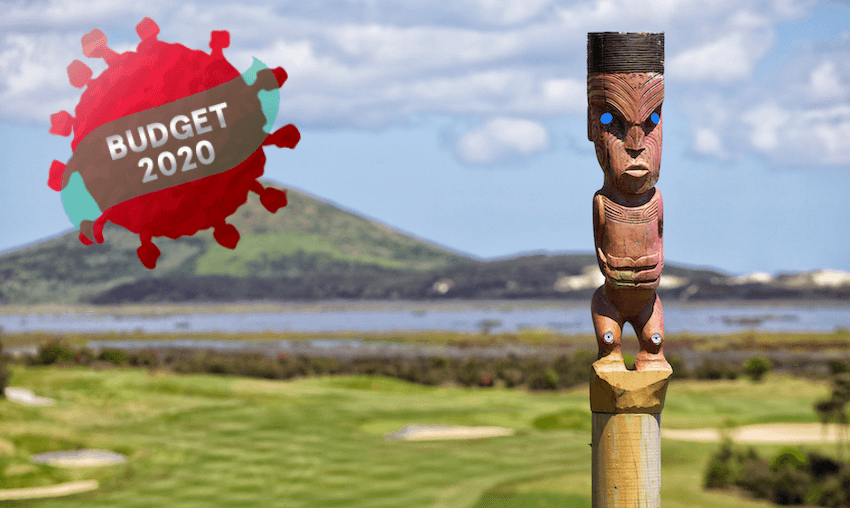This year’s budget was a chance to re-orient our economy to help it work better for Māori, not just now but into the future. The government failed to grasp the opportunity, writes Missy Te Kanawa.
For Māori, the budget met the Covid-19-created need but missed the long-term mark. There were some good wins, but overall it feels very much like a missed opportunity.
To be clear, it isn’t all doom and gloom. We have to celebrate the surface-level wins while being mindful that the devil is in the detail. Budget 2020 saw kohanga reo receive long fought for investment, and an increase in funding for Whānau Ora and te reo. Culture and identity is critical to our wellbeing, the development of our confidence and our sense of purpose. I’m hopeful that the Whānau Ora funding will help foster those qualities, so our people can both insulate themselves from future shocks and move toward training and work readiness. The targeted jobs and training package is a good start, but let’s reserve judgement to see what that means in the roll out.
That’s the good news. But the budget was an opportunity to orient our economy toward our desired future, to signal a flexing of the government mind from its traditional roots, and to infuse the hope needed to get us all through. As Māori, we were somewhat let down.
That sense of letdown has nothing to do with the level of spending; it’s the highest its ever been. Of course, with a little more than half a percent of total government spend specifically targeted toward Māori, more is always welcome. The disappointment has more to do with the approach: same old, same old, with more dollars but very little innovative thinking.
This was the time for the government to reach out to their Treaty partners and say “we need your help, we just can’t do this ourselves. We don’t have all of the answers and we are keen to work with you to find some solutions.” There has never been a better time for the government to demonstrate its commitment to meaningful partnership than now – right in the middle of crisis. But the moment came, the moment went and that chance to usher in a new era in the first year of this decade passed.
That the government wasn’t yet ready to try something new is highlighted in this excerpt about the environmental jobs package from Grant Robertson’s budget speech:
“This includes a $433 million investment in regional environmental projects. These will support our economic and environmental recovery in partnership with local government and farmers. It will include restoring wetlands, stabilising river banks and removing sediment. There will be projects and jobs created across New Zealand, including in the Kaipara catchment.”
One of the most important players in the regional economy are iwi, given their interest in the care and wellbeing of people and environment. But the Treaty partner which is such a fierce advocate for the taiao didn’t rate a mention in Robertson’s comments.
It appears that we as Māori are still consigned to the low wage part of the economy with apprenticeships, trade training, cadetships and manual jobs seemingly the focus of the funding. All is not lost though; there is an opportunity to ensure that these jobs integrate the skills of the future. Can these jobs involve exposing employers to science, research and technology so they are better placed to make decisions to improve their own productivity?
In the business space, it was disappointing to see such low targeted investment in Māori business. There appears to be an assumption that Māori can simply access the mainstream government programmes but there are uniquely Māori needs and nuances that programme design needs to reflect. It would also have been awesome to see some targeted enterprise skill and capability provision – not the usual workshop-type delivery, but a scheme that could allow our entrepreneurs to spend time working with and for those with a track record of success, particularly in the high value spaces. It would have been wonderful to see initiatives to develop business skills and networks that could then be taken home to the regions.
The budget was also silent on how we balance globalisation and localisation given the uncertainty of the global markets. Hopefully this is something that can be kept front of mind. If global events force us to include more localisation in our portfolios, we will need to start thinking hard about what it will take for that to be sustainable.
And let’s not forget the significant increase in funding destined for Wellington in the form of departmental budgets. It’s time to start talking about whether that is best directed to the regions in the form of more direct investment. I’d like the government to look at forming regional decision-making boards with iwi as a foundation partner alongside local authorities and business, which could work with central government to target spend for their own region.
In the wake of Covid-19, Budget 2020’s short-term outlook was necessary – and therefore somewhat underwhelming. But that’s not the end of it. We have an opportunity to ensure that approaches to the short term spend incorporate longer-term mechanisms so Māori can get the uplift we seek. Kia ora ra.
